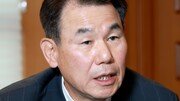[동아경제가 만난 사람] Eunbo Jeong, Chairman of the Korea Exchange
In the end, it is up to the company to increase its corporate value… The government must lead industrial restructuring
In addition to protecting investors including minority shareholders… There is an urgent need to protect management rights, including multiple voting rights.
Jeong Eun-bo, chairman of the Korea Exchange, is being interviewed by the Dong-A Ilbo at the Seoul office of the Korea Exchange in Yeongdeungpo-gu, Seoul on the 21st. Reporter Jeon Young-han [email protected] “The Korean stock market is at a crossroads whether to be filled with innovative companies like the United States or to stay in the past like Japan. “It is a time when social efforts must be concentrated, with the government leading industrial restructuring and companies finding new growth engines.”
While stock markets around the world are hitting record highs based on abundant liquidity, the Korean stock market is still stuck in the ‘box index’ (KOSPI that stays in the box range). In an interview with the Dong-A Ilbo held at the Seoul office of the Korea Exchange in Yeongdeungpo-gu, Seoul on the 21st, Jeong Eun-bo, Chairman of the Korea Exchange, expressed deep concern about the Korean economy failing to find a ‘breakthrough’ and the resulting alienation of the Korean stock market.
Regarding the recent sluggish performance of the KOSPI, Chairman Jeong said, “It is the result of the Korean economy failing to find a new growth engine in the era of post-manufacturing,” adding, “Investors’ doubts that domestic secondary battery companies will fall behind China are reflected in the stock price.” did it
Recently, the fact that domestic investors and institutions are turning away from the Korean stock market and increasing investment abroad, such as in the United States, was also viewed as a “natural phenomenon.” Chairman Jeong said, “In the capital market economy, who can stop you from investing in places where there is a motive for profit?” and “American investors in the 1980s and Japanese investors in the 1990s also switched to investing overseas rather than domestically, but Korea is an exception. “It can’t be,” he said.
He went on to emphasize that although the exchange has recently been actively pursuing a corporate value-up program together with the government, it is ultimately the company’s ‘homework’ to increase its competitiveness and investment attractiveness. Chairman Jeong said, “Value business is about eliminating ‘discount’ and raising the stock price to the level of the company’s intrinsic value,” and pointed out, “It is the company’s responsibility, not the exchange, to increase the company’s intrinsic value.” This means that in order for the Korean stock market, and by extension the Korean economy, to escape from stagnation, companies need to make efforts to innovate.
Chairman Jeong said, “The United States has succeeded in innovation by changing its economic structure to center on intellectual industries such as information technology (IT) such as the Internet, and artificial intelligence (AI), while Japan has failed to innovate and is experiencing difficulties in growth.” “We are at a crossroads as to whether we will succeed like the United States or fail like Japan,” he said. He continued, “Japan’s Nikkei Stock Average has surpassed 40,000 yen this year, 35 years after hitting its all-time high (38,957 yen) in December 1989.” “It could be at the highest level,” he warned.
He argued that in order to grow innovative companies and embrace them in the domestic stock market, ‘protection of management rights’ is necessary in addition to protecting investors such as minority shareholders. The reason why the so-called ‘Magnificent 7 (M7)’, including Apple, Alphabet (Google’s parent company), Amazon, Meta, Microsoft, NVIDIA, and Tesla, can grow rapidly and lead the U.S. stock market is the management rights protection system such as multiple voting rights. It is believed that played a role.
Chairman Jeong said, “One of the reasons Coupang chose to list in the U.S. was that the U.S. stock market recognized the multiple voting rights system,” and added, “It is time to review institutional supplementation in Korea as well in terms of protecting management rights.”
He also pointed out that “politicians should have a heavy heart” about the sluggish domestic economy. In particular, regarding the recently controversial financial investment income tax, he said, “In principle, it is necessary to introduce it, but it is premature,” and urged, “The political world must quickly remove uncertainty about whether it is postponed or abolished.”
People Donga Economics met >
SubscribeSubscribe

I also recommend these subscriptions!
-

cat eyes
-

Resolution of legislative conflict, asking for directions abroad
-

today and tomorrow
Reporter Lee Dong-hoon [email protected]
-
great
0dog -
I’m sad
0dog -
I’m angry
0dog -
I recommend it
dog

